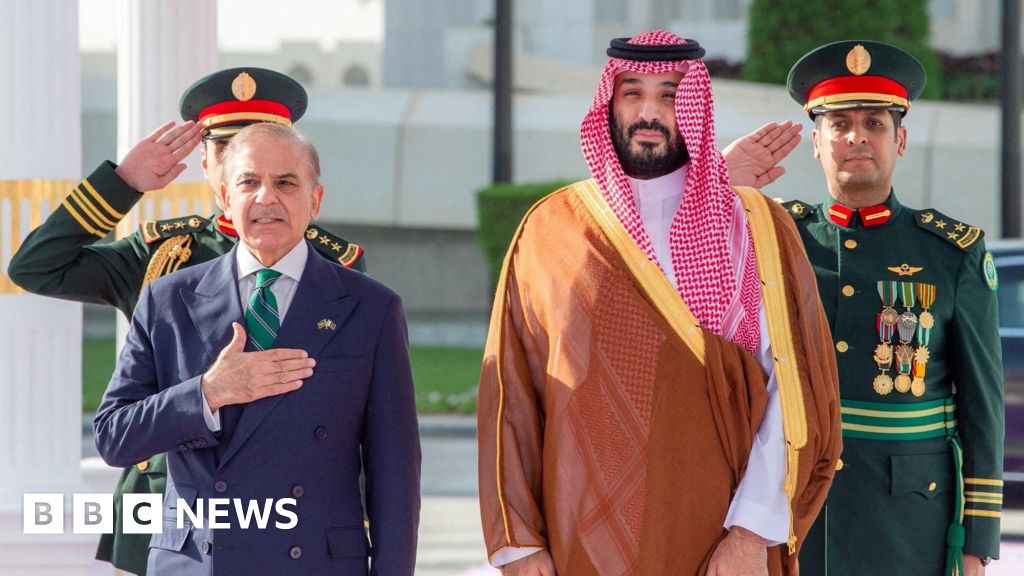Soutik BiswasIndia correspondent
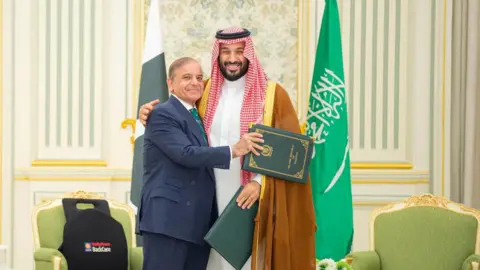 Reuters
ReutersWhen Shehbaz Sharif, Pakistan’s prime minister, clasped Saudi Crown Prince Mohammed bin Salman in Riyadh last week, the symbolism was unmistakable.
The embrace followed the signing of a “strategic mutual defence agreement”, bringing the Islamic world’s only nuclear-armed state closer to the Gulf’s most ambitious monarchy.
A senior Saudi official told Reuters that the pact was merely an “institutionalisation of long-standing and deep cooperation”. But many in India see it differently.
Despite Delhi’s cultivated warmth with Riyadh, the pact lands amid heightened hostility with Pakistan, including a four-day conflict earlier this year. Nuclear-armed neighbours India and Pakistan have fought multiple wars and clashes over Kashmir, making any move by Saudi to underwrite Pakistan’s military a direct concern.
What unsettles Indian analysts the most is the pact’s commitment that “any aggression against either country shall be considered an aggression against both”.
“Riyadh knew India would construe the Saudi-Pakistan pact as a direct threat to its security, yet it went ahead,” Brahma Chellaney, an Indian strategist, posted on X.
“The move reflects not Pakistan’s strength – it remains on the brink of bankruptcy – but Saudi Arabia’s ambitions”, he says. Binding a “chronically dependent” partner, he argues, gives Riyadh both manpower and nuclear “insurance”, while demonstrating to India, Washington and others that it will chart its own path.
Former Indian foreign secretary Kanwal Sibal called the pact a “grave misstep” by Saudi Arabia, warning that this could have serious implications for India’s national security.
“A politically unstable and economically broken Pakistan as a security provider is a dangerous proposition. Saudi Arabia knows this will be construed in India as a threat to India’s security,” Mr Sibal posted on X. “Given the tensions between Pakistan and India, this Saudi step is strategically most adventurous.”
India’s Narendra Modi-led government has been more circumspect, with a foreign ministry spokesman noting that the government will “study its [the pact’s] implications for national security and regional and global stability”. India also hoped that the strategic partnership between India and Saudi Arabia would “keep in mind mutual interests and sensitivities”.
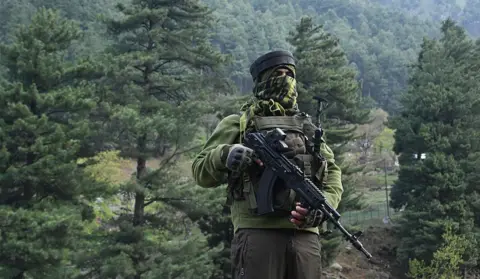 AFP via Getty Images
AFP via Getty ImagesNot all analysts are alarmed, saying Delhi may be overstating the risks since Riyadh values balanced ties – India is its second-largest trading partner and a major buyer of Saudi oil.
Michael Kugelman, a foreign policy analyst, cautions against over-reading the agreement. It “does not hinder India in a direct way”, he told the BBC. Saudi Arabia, with its own extensive ties to India, is “not about to engage in hostile retaliatory acts against India”, he said.
Still, by embedding Pakistan in the security architecture of the Middle East, the deal “checkmates India” and leaves its neighbour anchored to three patrons – China, Turkey and now Saudi Arabia, Mr Kugelman said. China and Turkey supplied weapons to Pakistan in its recent conflict with India.
Others argue that the real significance of the pact lies less in any immediate threat to India and more in how it reshapes regional alignments.
Husain Haqqani, a former Pakistani ambassador who is currently a scholar at Washington DC’s Hudson Institute and the Anwar Gargash Diplomatic Academy in Abu Dhabi, told the BBC that India’s concerns span “multiple fronts”.
He warned that the pact could make Saudi Arabia what the US was to Pakistan during the Cold War – “a country with the economic muscle to help Pakistan build its military to compete with India”.
Much depends, Mr Haqqani notes, on how the pact defines “aggression” and “aggressor” and whether Riyadh and Islamabad see eye to eye. He also cautioned it could strain India’s hard-won economic and diplomatic ties with Riyadh.
But not everyone sees the pact as a game-changer.
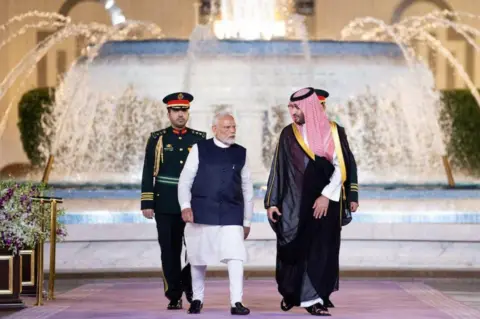 Reuters
Reuters“This pact is simply the formalisation of a long-standing Saudi-Pakistan understanding that goes back to the 1960s,” says Md. Muddassir Quamar of the Centre for West Asian Studies at Delhi’s Jawaharlal Nehru University.
Indeed, the two countries share a resilient relationship rooted in defence ties – from Pakistani troop deployments in the 1960s to commandos helping quell the 1979 Mecca mosque siege.
Riyadh has since bought Pakistani weapons, relied on its officers to build up the Saudi Air Force, and cultivated Pakistan as both an ideological ally and security partner. In 2017 Riyadh had also tapped a retired Pakistani army chief to lead its Saudi-sponsored anti-ISIS coalition.
Mr Haqqani notes that Saudi political, economic and military support has underpinned this reliance for decades.
“Since the 1970s, Saudi Arabia has consistently backed Islamabad, siding with it during the 1965 and 1971 wars with India, extending economic aid in times of crisis, allowing deferred oil payments, and maintaining a close military partnership,” he says.
Beyond the longstanding alliance, experts point to a bigger trigger: declining faith in the US security umbrella and growing doubt that it can – or will – defend the Gulf in a crisis.
Israel’s recent attack, which rattled Qatar and other Gulf states, reinforced Riyadh’s doubts – compounded by its long-running rivalry with Iran – about relying solely on Washington.
The deal is less about battlefield commitments than signalling intent, says Ahmed Aboudouh, associate fellow at Chatham House and senior researcher at Emirate Policy Center.
“It is designed to convey a message that Saudi Arabia is diversifying its security partnership without jeopardising its defence cooperation with the US,” Mr Aboudouh told the BBC.
“Although the operational depth of the deal is unclear, it indicates a shift in Saudi Arabia’s threat perception, seeing both Iran and Israel as a threat, and benefitting from Pakistan’s nuclear power status to enhance deterrence.”
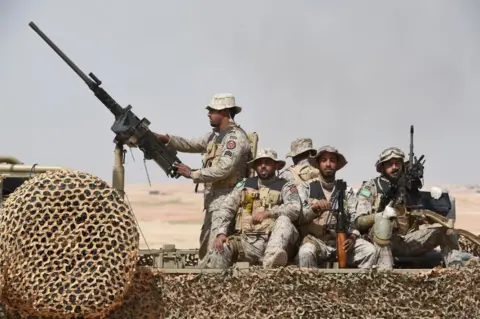 AFP via Getty Images
AFP via Getty ImagesFor India, the pact may carry wider geopolitical echoes. As Mr Aboudouh notes, India need not worry from a defence standpoint.
The real risk, he told the BBC, lies elsewhere: a broadened alliance could harden into an “Islamic Nato”, complicating Delhi’s ‘Look West’ strategy across trade, investment and strategic corridors in the Gulf.
For Pakistan, the pact leverages Saudi’s financial clout to boost its military capabilities and Riyadh’s soft power to secure wider political backing, leaving India to face not just Pakistan but a broader coalition of Muslim states, according to Mr Aboudouh.
Mr Kugelman says the pact tilts the regional balance in Pakistan’s favour. India, which avoids formal alliances and has seen ties with Pakistan – a key US partner – nosedive again, will need to recalibrate.
“Certainly, it can count on close ties with Russia, Israel, the Gulf states and key Western partners like France,” he adds. “But the issue is less about greater Indian vulnerabilities than Pakistan’s growing strengths.”
Even if the pact poses no immediate security threat to India, experts say it has not been good optics for Delhi diplomatically. How it ultimately plays out remains to be seen, and Delhi will be watching closely.
Follow BBC News India on Instagram, YouTube, X and Facebook.
